KABUL, Afghanistan — In the west of Kabul, behind the blast-proof walls of a fortified compound, Attaullah Nasib removed his blue suit jacket and sank into a sofa outside his campaign office. Underneath, he wore a traditional shalwar kameez, the color of eggshells.
It was just after lunch. Afghanistan’s long-delayed parliamentary election, finally set for October 20th, was less than a week away. Nasib, who was seeking to represent Kabul in the national assembly, had been making the campaign rounds for months, but he still felt unsettled, as if his home country’s tangled politics might ensnare him at any moment. Back in America, where he had come of age, he had last worked as a programmer at a Washington, D.C.-based consulting firm, chuckling to iHeartRadio shows as he slogged through the Beltway traffic. Here, he rode to campaign rallies squeezed between bodyguards, a Kalashnikov rifle on the dashboard. Here, he clutched his worry beads through meetings, careful to keep his emotions coded.
Nasib closed his eyes and drew a deep breath before rising to receive the two men who had just arrived to see him. His visitors were the aides of a well-known, former official who was once beset by scandal but now eyeing Nasib’s help for a comeback. Everyone had an agenda—this was Nasib’s first lesson in Afghan politicking, after a lifetime far from its grasp. In the early 1980s, his family had fled from Afghanistan’s Nangarhār Province amid the Soviet persecution of neighbors and kin. The third of eight children, Nasib was born inside a refugee camp in Pakistan. He landed in the United States in 2004 and enrolled at a local community college in San Francisco. A soft-spoken 19-year-old, he listened to 50 Cent; when his English improved, he transferred to San Francisco State University, where he majored in economics.
Now, more than a decade later, he found himself back in Afghanistan, navigating the cracks and openings of a new terrain.
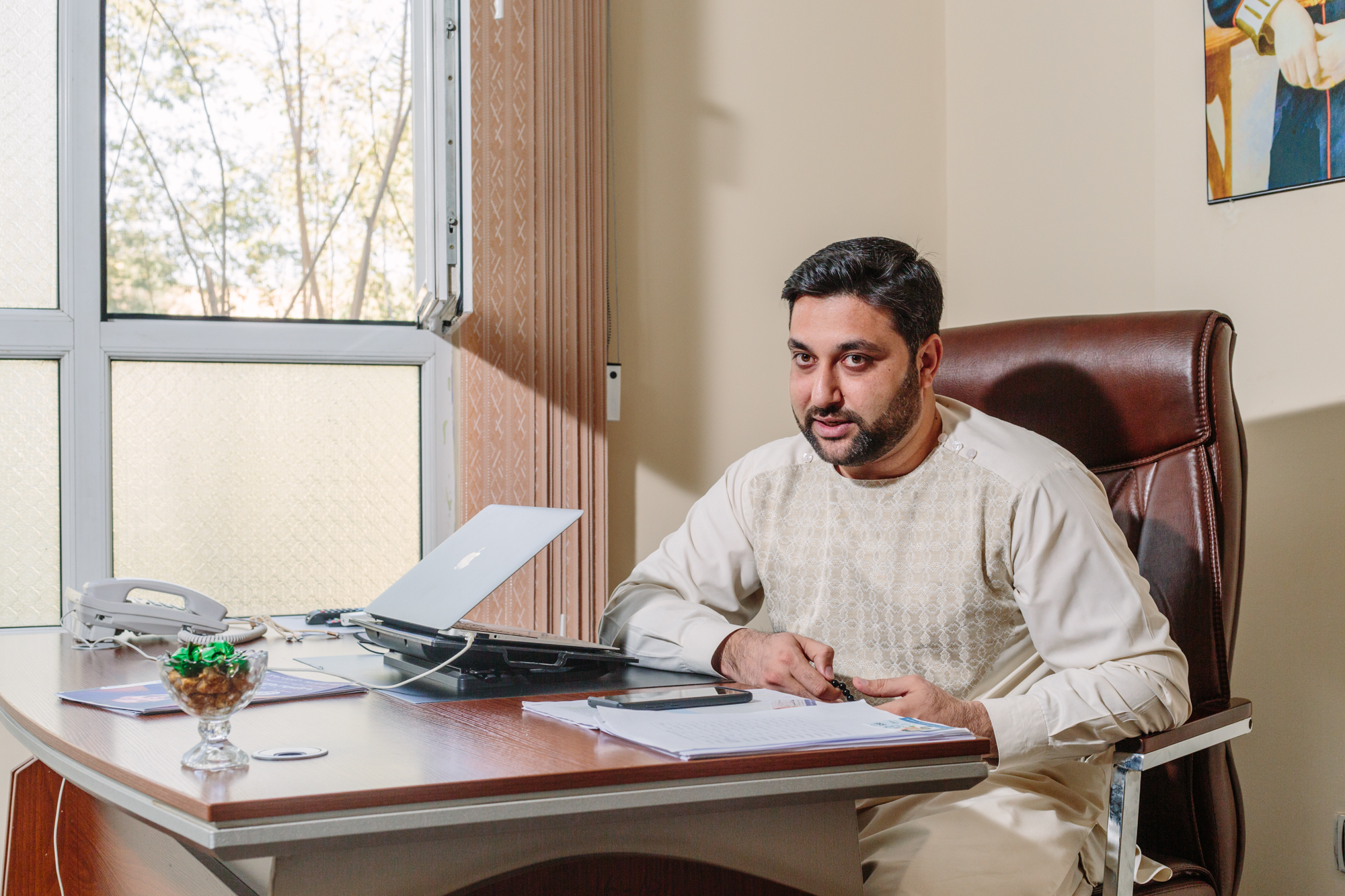
(Photo: Christopher Jones)
Humayun Sahib, the first aide, had fierce black eyes and a maroon pakol resting atop his thick, black hair. His portly companion followed behind in navy blue robes. They greeted Nasib in the Afghan custom, each man clutching the other’s arm then placing a hand over his own heart. “With the exception of our lives, we will give everything we can to help your campaign,” Humayun said.
“Thank you very much,” Nasib replied. “We need friends like you.”
Humayun bowed. “We have the tazkiras.”
Nasib motioned for everyone to sit. Presenting tazkiras, Afghanistan’s national identification cards, to an aspiring politician was a crucial way for voters to indicate their support. “In total we have 1,200 tazkiras,” Humayun said. His hand came up to his chest.
Nasib returned the gesture. In Kabul’s crowded field, a voter block that size could mean the difference between victory and defeat.
A pattering of new arrivals floated up from downstairs. “You have many visitors now,” Humayun said. “We will make time to discuss this tonight. You can come to our guesthouse in Pul-e Surkh. I’ll introduce you to more friends.”
Nasib gripped his worry beads and squeezed. “Yes, let’s meet tonight. There’s not much time left in the campaign.”
The two visitors pulled back to talk among themselves. An unsaid ask lingered in the air. Nothing came without a price—that had been Nasib’s second lesson in the thrum of Afghan politics, and he was learning it time and time again. He turned toward me, switching into English.
“The devil’s in the details, so we’re going to have to discuss the details tonight.”
He rose to his feet.
“This is Afghanistan,” he said, showing his guests toward the door. “I’m getting used to it now.”

Nasib hadn’t planned to try for office in Afghanistan, but he had fostered a sense of citizenship and service after working there early in his career.
After college, Nasib, who goes by Atta socially, landed a three-month internship with the United Nations Development Programme in Kabul, which turned into a full-time stint as an analyst. In 2011 he returned to the U.S. for graduate school in international affairs, and, soon after, became a naturalized U.S. citizen. While working as a rule-of-law staffer at the U.S. Institute of Peace, he returned to Kabul in 2014, where he eventually connected with members of Ashraf Ghani’s presidential campaign. When Ghani won, Nasib received an appointment in the new administration’s office. Gradually, working in Afghanistan as an adult filled in the abstractions of a country he barely knew as a child. “I had this sense of nostalgia,” he said. Traveling back and forth made the attachment grow.
He left Ghani’s administration after less than a year, citing disagreements with some of the president’s staff, and returned to the States to start a family. He got married and had a son. Then, in Washington, D.C., in the spring of 2018, as he tapped at the keyboard at his IT desk job, his cell phone buzzed with a long-distance call from Kabul. His father’s voice pulsed with the weight of important news. Following months of deliberation, their tribe’s leadership had just nominated Nasib to represent them in the upcoming parliamentary race. At the council’s recent shura, Afghanistan’s traditional decision-making forums, the elders had aired their most personal stories from four decades of conflict and loss, some moved to tears as they discussed the past, the present, and their hopes for the future. Ultimately, they decided to select someone young and fresh—someone with promise from the next generation. Nasib’s father wanted to know: Would he accept?
Nasib was stunned by the call. He was weeks shy of his 32nd birthday, and his life in the U.S. had slipped into a comfortable routine. Yet many aspects of Afghan culture still governed his behavior, respect for his elders being chief among them. “Forget what I think,” he told his father. “What are your thoughts?”
After a long pause, Nasib’s father replied, “Our people have suffered through the brutalities of the mujahideen [holy warriors], the Taliban, and now this ongoing war.” He assured his son that the young man would make a great candidate.
Still, Nasib was initially unsure of accepting the shura’s nomination, plagued by doubts over what impact he might have and how effective he could be in mobilizing people for change. They were “very reasonable concerns,” said Javid Ahmad, a senior fellow at the Atlantic Council, who has known Nasib since childhood. Ahmad had closely followed Afghanistan’s political scene as it fractured into chaos, but he was adamant: This was precisely why Nasib had to run.
Moved by the faith of his family and friends, Nasib felt the pull of his ancestral home, the call toward something far greater than himself. He returned to Kabul on May 18th. When he appeared in front of the shura for the first time, he could feel something else: the weight of his new constituency’s expectations. Though the elders had approved of his qualifications, the meeting had felt like “an audition,” he recalled. “They were skeptical. There were questions, like, ‘We have a candidate from D.C.—does he even understand the politics here?'”
To prove he was up to the task, Nasib had to demonstrate his fluency in the local customs. “It was about really, really small things,” he said—beginning with demonstrating the proper conduct for an Afghan handshake.
When questions arose about his political connections in Afghanistan, he was able to shine, impressing the council members with his work on the Ghani campaign. “Word of mouth spread like fire in Kabul that all these people are my friends,” Nasib said. “People’s concerns were alleviated pretty quickly.”
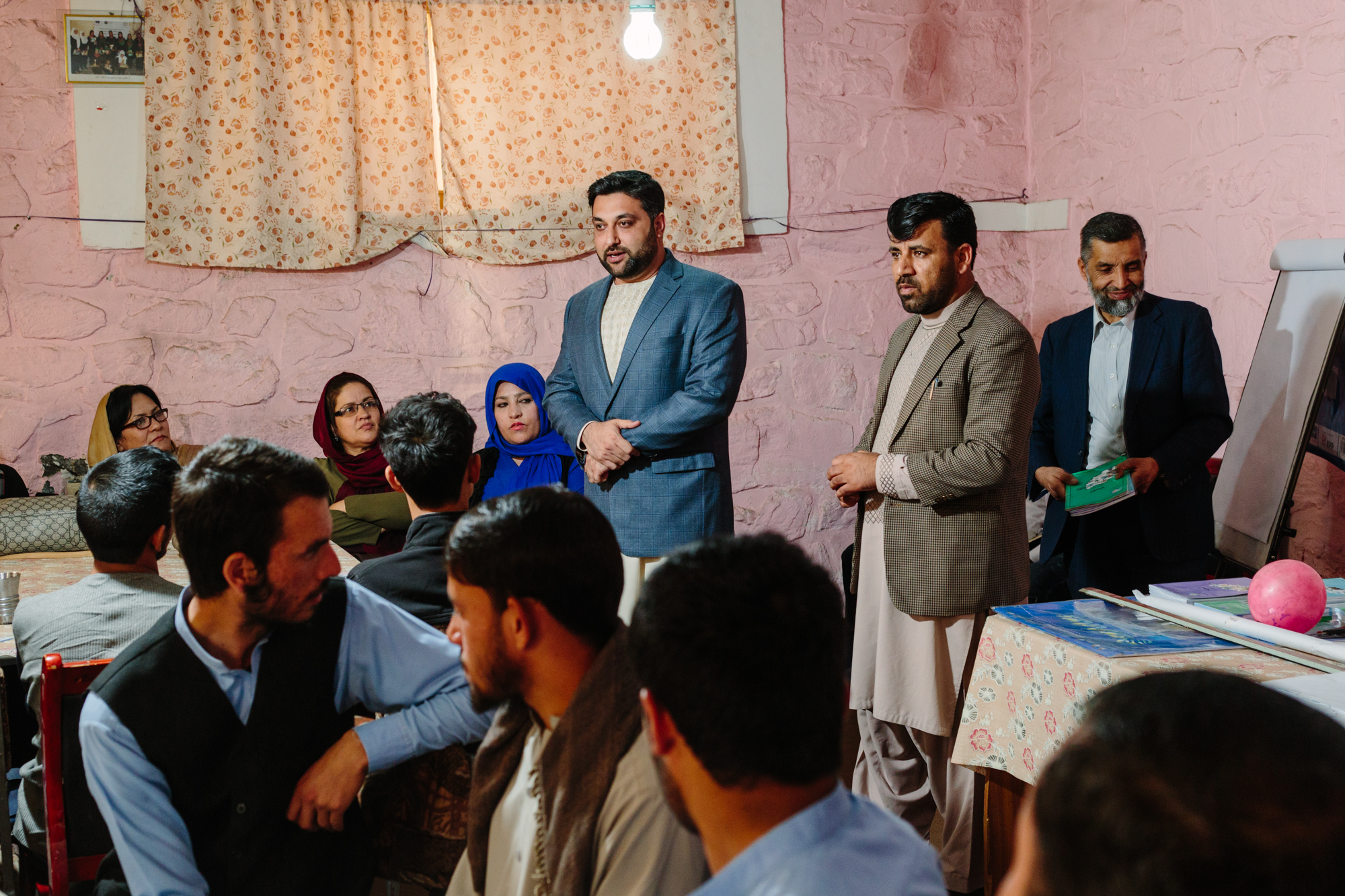
(Photo Christopher Jones)
Flush with their support, Nasib registered with the Independent Election Commission of Afghanistan, launched a Facebook page, and began pulling together a team. In 2002 his father had founded a non-governmental organization, the Welfare Association for the Development of Afghanistan (WADAN), and the NGO supplied a natural base for his candidacy, lending both a platform to reach voters and a network of volunteers for his campaign.
Almost immediately, the attacks began. Afghans with dual citizenship are eligible to stand for parliament, but Nasib’s international upbringing quickly attracted derision. He recalled one local critic who demanded that he renounce his American citizenship, while others labeled him a foreign stooge and an “online candidate”—a free-moving transplant who could easily leave again when things got tough.
“There’s a grudge against foreign or hyphenated Afghans,” said Nasib, who felt the criticism was misplaced. He had been only a teenager, studying English in Peshawar, Pakistan, when the first American soldiers deployed in the fall of 2001. On his visits back to Kabul, he saw a city so choked with debris and machines of war that a person could hardly move down the street. Win or lose, he told me, he planned to stay in Afghanistan. “This country deserves for its diaspora to come back and help Afghanistan get out of these tough times,” he said. “Nobody’s going to fix this country but us.”

An old proverb classifies the three sources of conflict in Afghanistan as zar, zan, zamin—gold, women, and land—pillars of power that different groups have jockeyed over for centuries. The Soviet invasion in 1979 tilted the order, inciting the jihad, and over the ensuing years of bloodshed, a new class of mujahideen rose to influence by the force of their deeds on the battlefield.
Courted by the Americans during their invasion, many such warlords were able to consolidate their power by 2004, when Afghanistan held its first democratic election in the post-Taliban era. In the same year Nasib arrived in America, 18 candidates competed to become the new government’s president. Voters chose Hamid Karzai, the cunning, U.S.-backed dealmaker, shunting rivals who comprised some of the country’s most prominent jihadi leaders and strongmen. Not to be discouraged, several announced campaigns the following year for the Wolesi Jirga, the parliament’s lower house, joining a field of nearly 6,000 who ran for the parliament in 2005.
Few among the candidates could tout clean records; bloody pasts and corrupt dealings were a common inheritance. According to an analysis by the Afghanistan Research and Evaluation Unit, the country’s first democratically elected parliament in 30 years featured “40 commanders still associated with armed groups, 24 members who belong to criminal gangs, 17 drug traffickers, and 19 members who face serious allegations of war crimes and human rights violations.” The same report found that more than half of the Wolesi Jirga’s new members had fought in the jihad. In a dark brush of irony, many of these same figures, whose violent transgressions in the civil war had spawned the Taliban in the first place, wound up right back in power. (In 2007 the parliament voted to confer amnesty upon all perpetrators of war crimes.)
The result has been a defunct assembly. According to an Asia Foundation report, only 35 percent of Afghans in 2017 expressed confidence in their member of parliament, the lowest measure across 11 different institutions and officials. A plurality of respondents said the issue their MPs cared for the most was serving their own personal interests. Scott Guggenheim, an American and former adviser to President Ghani, has reportedly said the parliament resembles less a democratic institution than “a bunch of warlords dividing up national rent.”
A 2017 investigation by Integrity Watch Afghanistan found that Afghanistan’s budgeting process was “riddled with incompetence, corruption, and collusion,” and masked a “pattern of patronage,” in which parliamentarians routinely negotiated personal benefits with government ministries. Reports that year also surfaced that the speaker of the lower house, Abdul Rauf Ibrahimi, had siphoned millions from the parliamentary budget for his own use. First, Ibrahimi dismissed the allegations. Then, he agreed to return the money. Soon after that, he announced his bid for re-election.
On Transparency International’s Corruption Perceptions Index 2018, Afghanistan ranked 172nd out of 180 countries.
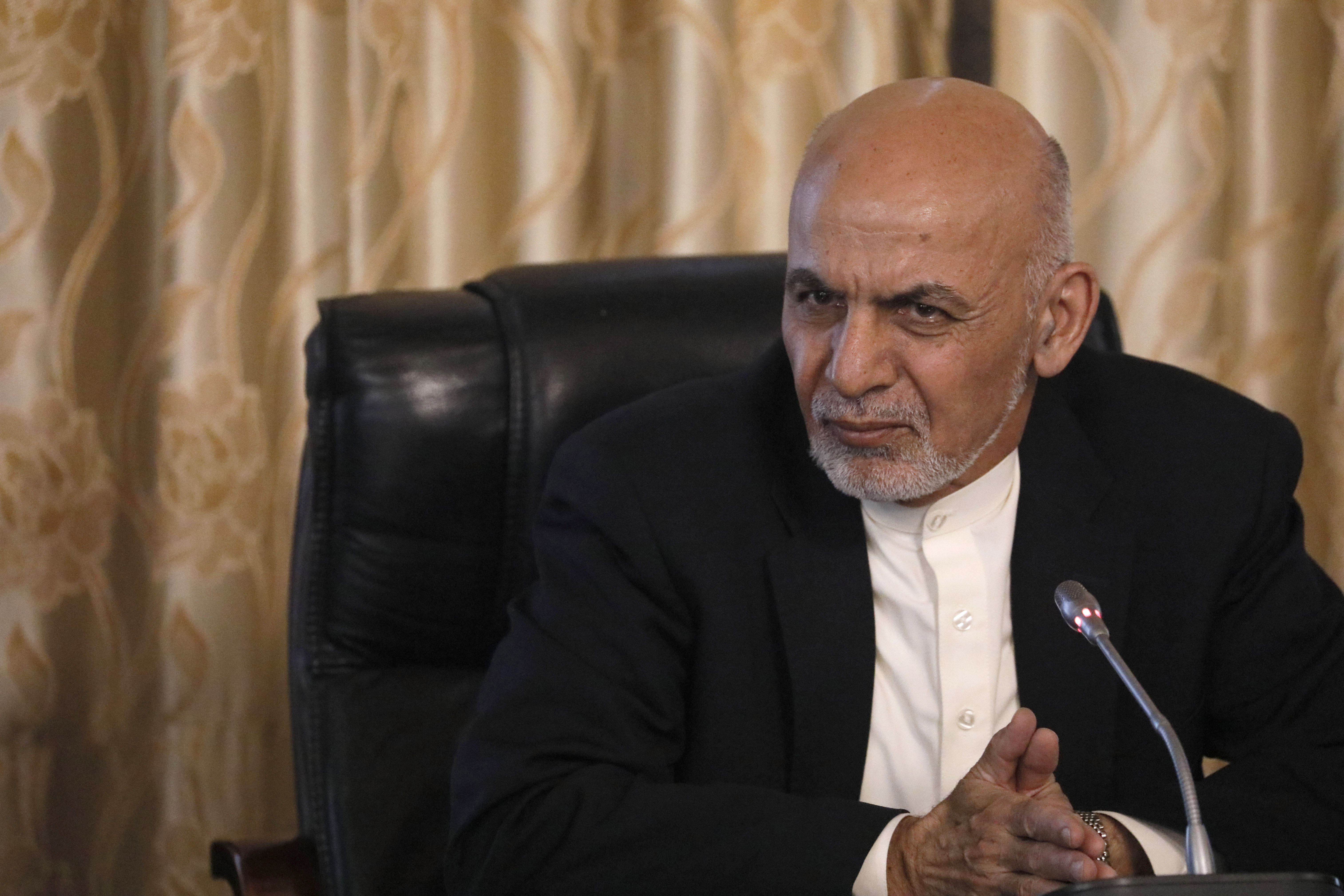
(Photo: Jonathan Ernst Pool/Getty Images)
The foul play begins before candidates arrive in office. Since 2009 every major ballot has been marred by wide-scale fraud, each time bringing a political crisis to boil. In the aftermath of the 2014 presidential run-off, bitterly disputed election results produced a standoff that edged the Afghan government to the brink of collapse. A last-minute U.S. intervention cobbled together an awkward but tenable national unity government, granting the presidency to Ghani while creating a chief executive position for his leading opponent, Abdullah Abdullah. Elemental reforms were drawn: The country would fix its tangled electoral system, all sides pledged, before the parliamentary term expired in 2015.
The deadline came and passed. The reforms stalled. Government in-fighting proved insurmountable while members of the previous Wolesi Jirga, elected in 2010, pushed obstruction and self-interest to new extremes, squatting in power well beyond their mandates. The elections were delayed, then rescheduled, then delayed again. Among common Afghans and international partners alike, confidence in the government’s commitment to—and capacity for—democracy sapped to despairing lows.
Three years late, the parliamentary election was finally set for 2018.
Wishing to support a transparent election, Nasib told me he had launched his campaign with a single principle: “We are never buying votes.” But beyond that, he acknowledged, there were few absolutes.

Campaign season for the Afghan parliament began on September 28th, a Friday, and, by the end of the weekend, the capital was covered. Posters featured candidates young and old, men and women, some grinning as if for a class-day portrait, others somber as if weighed down by the country’s grave affairs. Stickers, no bigger than a child’s palm, invaded traffic signs, wrapped around water bottles, slipped into takeout bags of naan. On social media, I was told, people warned each other not to stand idly on the streets; linger for too long, one voter joked, and someone might mistake you for a pole and slap you with his favorite candidate’s campaign bill.
More than 2,500 candidates stood for the Wolesi Jirga’s 250 seats: political scions and disgraced ministers, hardened commanders and corporate moguls, civil society leaders, celebrity journalists, even a plucky, neighborhood English teacher. In Kabul Province, 804 hopefuls competed for 33 seats. One candidate reportedly promised voters lives of luxury; another said he would solve all of Kabul’s traffic problems. One voter told me of a candidate who pledged to “stop the war between China and the U.S. in Afghanistan.”
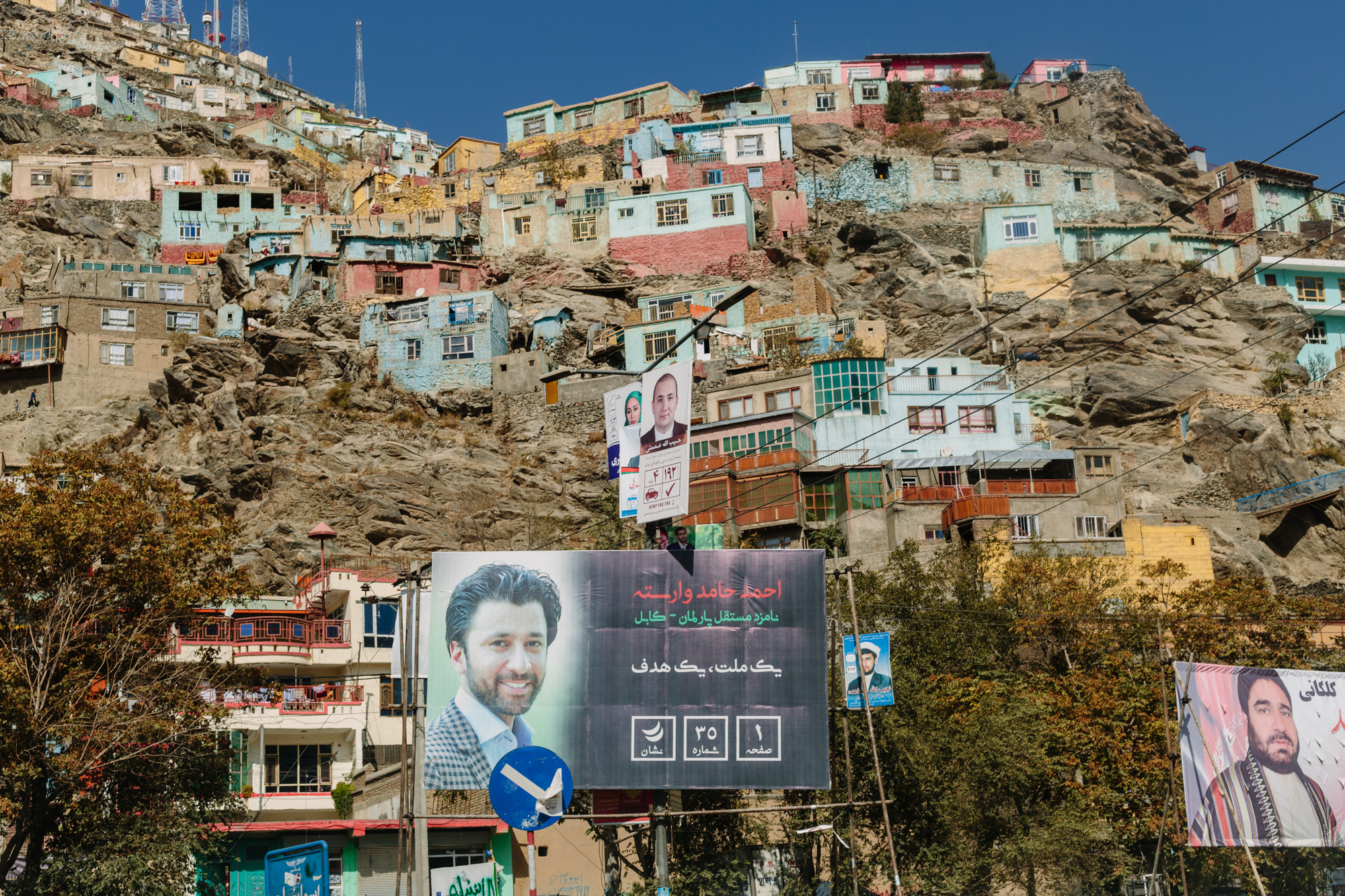
(Photo: Christopher Jones)
With nearly half the candidates reportedly under the age of 40—vying to represent a country with two-thirds of the population under 25—the theme of a generational turnover, washing out power brokers from the chambers, captured the public sentiment. Even the warlords were smart to the mood, many electing to feature their children, rather than themselves, on the ticket. Private money also made a significant entrance into the field. In past election cycles, prominent business owners had been content to bankroll promising candidates, but eight years of lost contracts had revealed the limits of corporate savvy without political sway. Running for office, and tapping directly into the spoils themselves, had become the rational business move.
In contrast to the businessmen’s approach, younger candidates echoed one another with broad calls for taghir, change. A new cohort was reacting against the excesses of its predecessors, said Abdullah Ahmadzai, who oversaw the 2010 elections as the chair of Afghanistan’s Independent Election Commission. “There is a shift away from the traditional politics that we had in the past, where a rich parliamentary candidate would suddenly start talking about renovating mosques, or building a bridge, or contributing to schools. The new generation is saying, ‘Don’t expect that from me.’ They talk about monitoring. They talk about legislation. They talk about budgeting.”
Fielding suspicions over his American citizenship, Nasib found himself attempting, with mixed success, to explain the country’s state of affairs among people who connected him to the country’s woes. Afghanistan’s whole economy had flourished in the boom days after 2001, he told prospective voters, when a tide of international funding swept through the country. For nearly a decade, the Afghan economy averaged over 9 percent annual growth, with the majority of the development budget coming from abroad. Then came the crash: In tandem with the 2013 pullout of American troops, U.S. aid shriveled from $13 billion to $7.3 billion in two years. Economic growth sank to 1.45 percent in 2015, and unemployment peaked at a record high of 40 percent.
“My spiel to voters was basically that, between 2001 and 2014, everything that was happening in Afghanistan was artificial,” Nasib said. “Our economy was artificial. Our security was artificial. Our political stability was artificial.” Yet as grim as conditions were, he noted that the withdrawal of the international community also meant Afghanistan was finally taking ownership of its own fate.
Nasib, who tried not to sugarcoat anything, ultimately landed somewhere between optimism and caution. His policy proposals emphasized reducing bureaucracy and expediting delivery of social services. Yet no serious progress, he believed, could be made without first acknowledging how far in the pits the country had fallen. “This is our reality,” he said. “And it’s going to take a generation or more to fix. This is the real Afghanistan.”
The day when the real Afghanistan is a stable, prosperous country will require peace with an emboldened Taliban—negotiated by a legitimate state, installed by credible elections, held to accountable procedures. The war is not only a clash between armies and ideas; it is also a contest of governance. No one I spoke with expected anything resembling a free and fair election, but many believed a marker to signify some amount of progress, however marginal, was within reach. The crux of the parliamentary election, then, was to show that the Afghan people had not yet surrendered their stake in choosing their own government—that the country’s 17-year experiment with democracy was alive, on the mend, and, ultimately, still worth fighting for.
More than ever before, the election would be the nation’s own. I met an Afghan journalist who said that so many American soldiers were stationed at the IEC headquarters during the 2014 presidential race that it resembled a military base more than an election office. By contrast, this was to be the first post-Taliban election fully managed by Afghans themselves: Fewer than 50 formally accredited international election observers remained, down from several hundred in 2014 and over 1,000 in 2009. It was a watershed moment. “Just the fact that we’re able to pull this election together at a time with so much less foreign engagement,” the journalist told me. “That is a success story.”

As his campaign stretched into fall, Nasib found himself adapting, uneasily, to politics in the real Afghanistan. He had always considered himself a people-pleaser—a quality he attributed to his socialization in America—and sought in the first weeks of campaigning to accommodate everyone who wished to see him. But back in his native country, exposed daily to the needs of a diverse and desperate populace, he quickly reached his limits. “The requests were overwhelming,” he said.
There was the state bank official who had just gotten reassigned to an outer province. Could Nasib tender his transfer back to Kabul?
There was the young man on death row calling from inside Pul-e-Charkhi, one of Afghanistan’s biggest prisons, promising the support of his fellow inmates in return for reducing his sentence. “I follow you on Facebook,” he told Nasib.
“How do you have Facebook?”
“We have thousands of prisoners in here and twice as many phones.”
Then there was the poor man who showed up at their offices one day inquiring about securing a wife. Nasib was polite. He offered to see what he could do. Afterward he told a group of hysterical aides, “This is a campaign office, not a marriage office.”
Since 2005, elections in Afghanistan have operated by an uncommon procedure called the single non-transferable vote (SNTV), which bypasses districting and treats each province as one large free-for-all race. A virtually uncapped number of individuals is allowed to compete, and the candidates who achieve the most votes in a province fill its allotted seats.
International election experts almost unanimously oppose the SNTV system. Since the procedure often results in numerous candidates splitting the total vote count, it disproportionately favors candidates able to bank on outsized reputations or geographic strongholds—primarily warlords and military strongmen. Political parties and issue-based coalitions face strong disincentives from ever forming. Kabul Province, which has 33 seats, the most of any region, represented the most fractious battleground; in 2005 one candidate secured victory with only half a percentage of total votes cast.
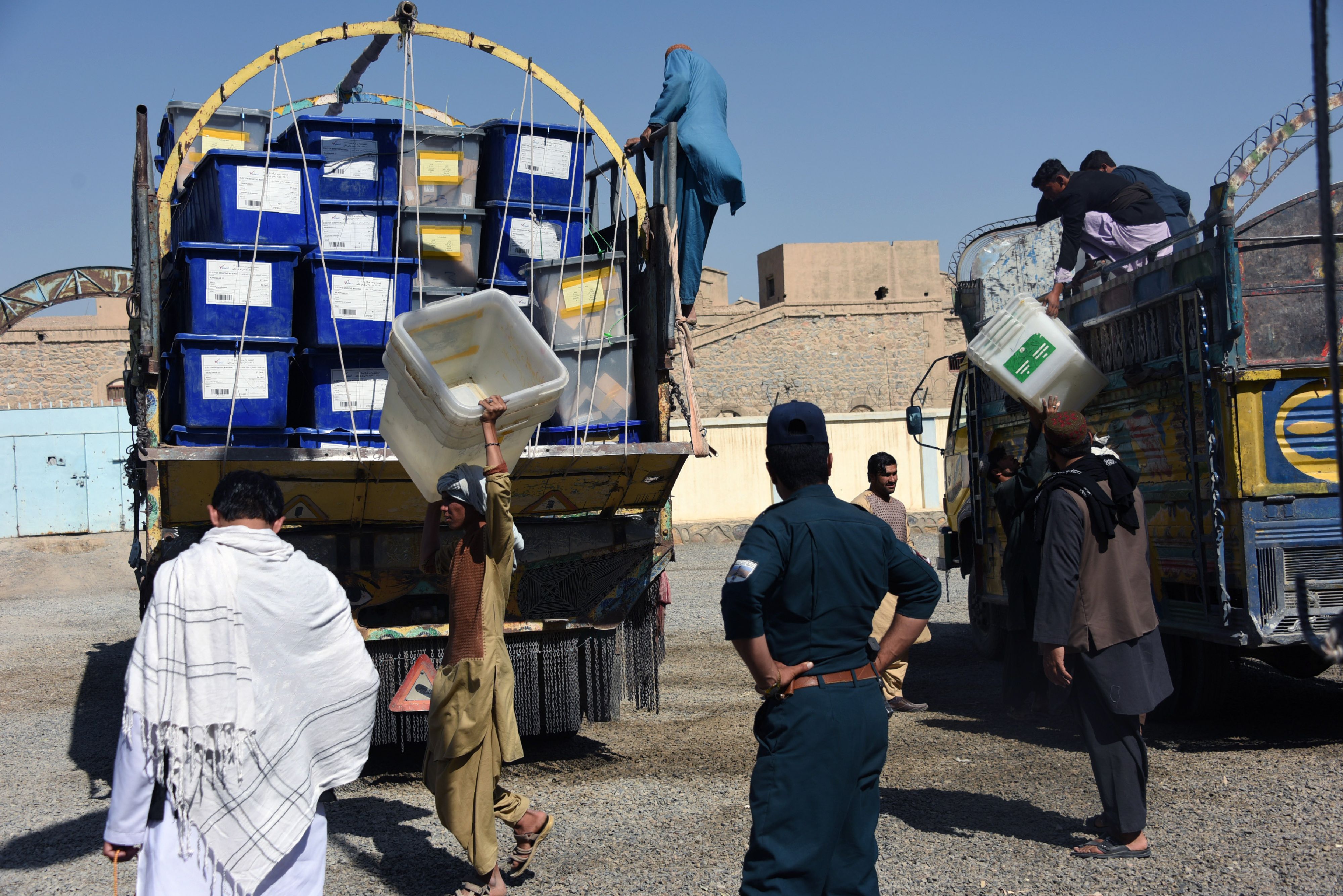
(Photo:Javed Tanveer/AFP/Getty Images)
Many of Nasib’s tribal elders live in Kabul’s majority-Pashtun neighborhoods, linking together a formidable band of support in the city’s east. Over lunch of chicken sajji one day, ahead of an afternoon rally, Nasib referenced what he saw as Hillary Clinton’s biggest campaign mistake. “She diverted focus away from her own states to turning Georgia, Arizona, Texas blue. That did not go over very well with her voters—especially in the Rust Belt states. That’s why we’re mostly focusing on our own base.”
Solicitors who met with Nasib often began by establishing their credibility—disclosing a community group they belonged to, hinting at the size of its membership, casually referencing how frequently the group gathered. At some point, without fail, the overture was laid bare: We can get you x votes—typically in tidy blocks—50, or 100, or 250. The boldest claims, Nasib said, were usually the most bogus. “Anybody who promises over 1,000 votes, I simply don’t believe. Anybody who says, ‘I have 10,000, 20,000 votes,’ I tell them: ‘Why aren’t you running yourself? Or somebody from your family?’ You can elect multiple people with those votes.”
However big the offer, Nasib initially stuck to his pledge: We are never buying votes.
Some visitors huffed and left. Others tweaked their tune. “They say: ‘Hey, we want to support you and find you votes. But we’re going to need an office. Maybe you can furnish an office for us.'” It was a dangerous slope. The modified appeals initially unsettled Nasib, but, over time, he became more accommodating. A rug for a new office was fair game, then utensils, then larger pieces of furniture, and, eventually, even rent. Never buying votes evolved into the campaign’s new principle: We will never just pay you a lump sum. “I don’t know if it’s called bribery or not, but that’s how it is,” Nasib said. “It’s normal in this town.”
One day a lady showed up asking Nasib to help her non-governmental organization, which had 500 employees. Without signaling a commitment, Nasib thanked her for her hard work.
“Inshallah you will be the winner,” the lady said. “A friend of mine has direct connections with the American Congress. He heard the good news that there will be an 80 percent change in parliament.” America as the omnipotent puppet master, pulling the strings of Afghan politics, was a commonly held view.
Nasib humored her. “Can you ask your friend if my name is on the list?” He stood to signal the end of the meeting.
Back at his desk, Nasib paraphrased a quote famously delivered by John F. Kennedy: Victory has many fathers, and defeat is an orphan. “That’s exactly what’s going to happen. Everybody’s going to take credit if you win, and nobody’s going to take responsibility if you lose.” He looked down at clenched hands. “That’s politics, I guess.”

Shortly after sunrise on Wednesday, three days before the election, Abdul Jabar Qahraman, a candidate from the southern province of Helmand, settled into his election office in Lashkar Gah.
His chair detonated.
The hidden bomb killed Qahraman and four others alongside him. The attack was immediately claimed by the Taliban, which had denounced the election as a “malicious American conspiracy” and called for its fighters to rise and create “severe obstacles.”
The news weighed heavily on Nasib, who arrived at his own office late in the morning, wearing a dark shalwar kameez the color of ash. “I’m lost for words,” he tweeted. “This is the 10th candidate who lost his life this election cycle. RIP.”

(Photo: Christopher Jones)
Nasib’s team had recently installed a second bulletproof gate, indoors, at the top of the stairs to his office, and two additional guards had joined his patrol, now shadowing him at all times. The heightened security was suffocating. “I hate Kalashnikovs. I hate guns. I hate guards with guns around me,” he said. From the start, opposing warlords and gun culture had been a key plank to his campaign, yet all the voices around him—shura elders, voters, visitors, friends—had called him naïve, pushing him to take greater precautions. “It was literally every day. People would come to me and say: ‘What the hell’s going on with you? Others have so much security, but you don’t have any. Conditions are different here. Anybody could just come over and set off a bomb. You never know.'”
Downstairs, a wooden podium had been brought out onto the patio, overlooking a tidy courtyard lined with red chairs. An elder assisting Nasib’s campaign was leading the team’s election observer training; more than 100 fresh volunteers sat before him, learning the particulars of standing watch at the polling sites and ensuring no funny business reached the ballots. The elder held up a sample ballot, a thick broadsheet packet with all of Kabul’s 804 candidates printed inside. Photos of the candidates were small, sometimes hard to recognize, while multiple candidates had the first name Atta. The elder repeated several times: Attaullah Nasib, page 13, candidate number 656. He advised the observers to give illiterate voters extra time, to ensure they matched Nasib’s face with his election symbol—a white teacup on a saucer. And if there were any other observers around offering voters their help, shoo them away, the elder warned with a blustery hand wave. “They could be opposition and working for their own candidate. They are trying to make people vote for the wrong candidate. You have to be awake.”
The elder paused to survey the audience as if settling numbers in his head. When he spoke again, his voice was light, casual. “Remember, if you bring five people to vote for Attaullah Nasib, we will make sure you get paid.”
In Kabul, arrangements to pay off voters were lurking down every street. I heard of one candidate, flush with cash from his business dealings, who “hired” unemployed Afghans for a one-month stint. To collect their paychecks, he gave them a simple job: Go out and convert four other voters. Others were less discreet. Students from Kabul University told me about a candidate who sent recruiters to campus, promising 1,000 Afghanis to anyone who worked as an election observer for his campaign. But when the students showed up for their training, the candidate’s offer changed. The team had enough observers, he said, how about 5,000 Afghanis straight into your pocket for your vote instead?
Though Nasib’s team was hardly the most brazen display, his modified campaign pledge—never pay a lump sum—had evidently sprung an addendum: except on election day.
After the observer training, Mohammad Agha Kochai, one of Nasib’s campaign directors, took to the podium. “The enemy is saying online that you should not go and vote, that you will get killed in explosions. Do not be afraid of them!” he said. “Brave Afghan soldiers will be protecting you in every voting zone. We should all encourage our friends to go vote. The election is from 7 a.m. to 4 p.m. Do not sleep on election day!”

Polling centers were scheduled to open at 7 a.m. On the morning of the election, the people of Afghanistan arrived early, yet at stations across the country, the doors remained closed. Election officials were reportedly derelict, registration documents missing. When biometric verification machines, imported at the last minute to counter the rampant ballot-stuffing of previous elections, stopped working, many poll workers, unfamiliar with the new technology, were unable to fix them.
Long lines turned into small crowds; small crowds became large ones. At many polling sites across the country, crowds were joined by armed groups, attempting to sway voters’ decisions either by force or by bribe. In Herāt, one man reportedly endured a four-hour wait just for poll workers to locate his name. Elsewhere, election staff received papers for the wrong province, while in northern Kabul’s Qarabagh district, ballot materials never arrived at all. Frustration mounted.
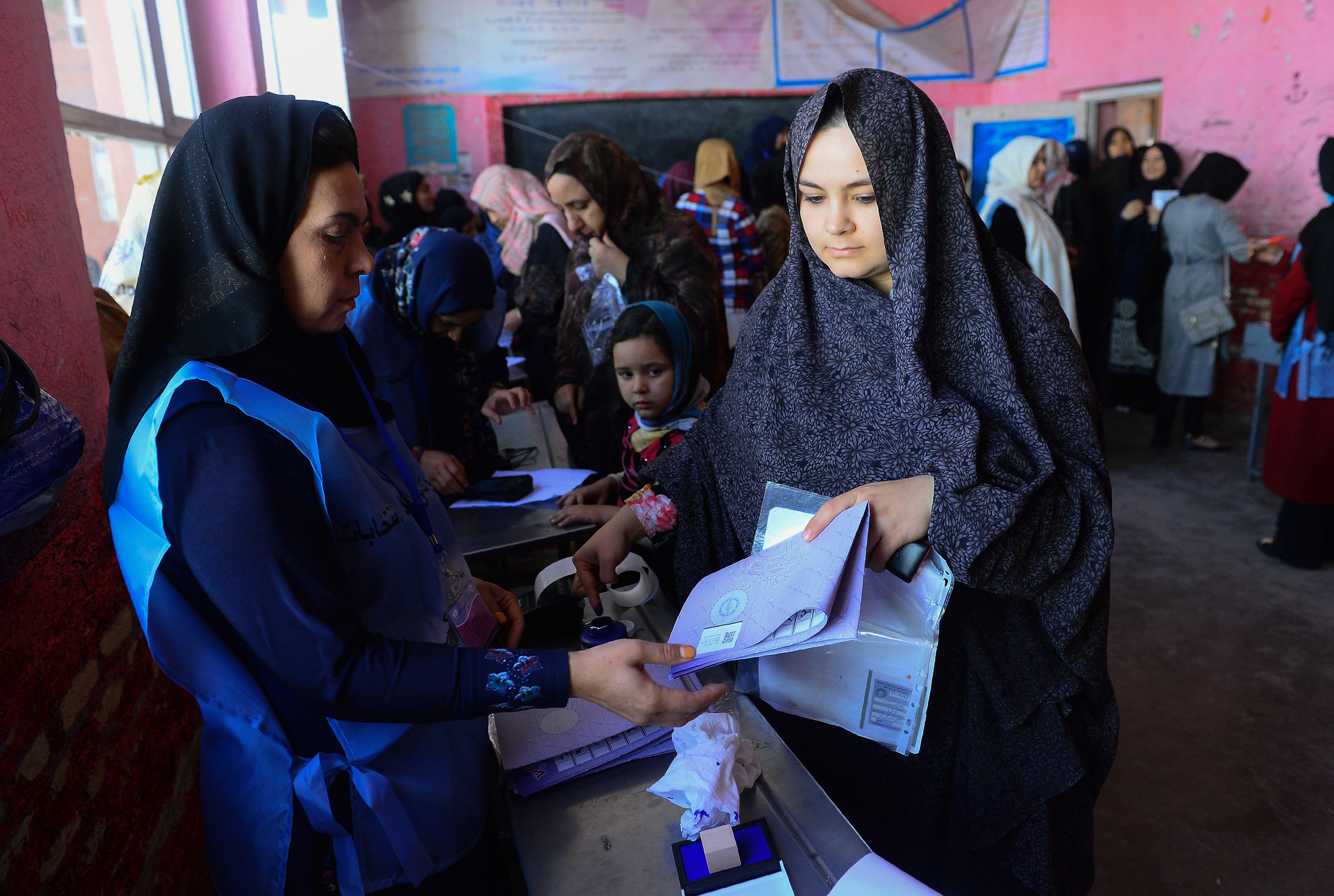
(Photo: Hoshang Hashimi/AFP/Getty Images)
Disillusionment grew. On WhatsApp and Facebook, tens of thousands of voters flooded a news network’s accounts with complaints. A morning broadcast had shown President Ghani, in a black jacket and turban, casting his ballot inside a local high school and calling for the nation to join him. Yet in Kārte Parwān, a few neighborhoods away, Chief Executive Abdullah arrived at his polling station and had trouble even finding his name on the voting list. On social media, people joked humorlessly: For all the government’s cheerleading, its own botched logistics might prove the election’s biggest disruptor.
The Taliban were not to be outdone. After carrying out a major assault on Ghazni in August, they had assassinated a key general in Kandahār just two days before polls opened. Elections in both provinces were delayed. Beginning at dawn on the day of the vote, the insurgency’s official Twitter account relayed gleeful alerts of mayhem and destruction:
- “Explosion set off inside polling station in Bagh Alam area of Qarabagh district #Kabul, site destroyed, workers flee as process fails.”
- “All roads leading to Ghaziabad district center #Kunduz closed, all CPs & bases under attack, sham electoral process halted.”
- “Attack on base in Bermal district #Paktika where enemy had built a polling station, casualties caused & sham electoral process fails.”
The danger lurked everywhere. By the end of the day, the insurgents would boast of 164 attacks across the capital and across the country, with dozens of lives lost and countless votes prevented. A subsequent report by the United Nations Assistance Mission in Afghanistan found it was the most dangerous election for Afghan civilians since 2001.
Through it all, the people of Afghanistan were resolute. One man in Jalālābād, stuck in line for hours, told reporters, “I would come to vote even if bullets were raining in the city just to have a proper parliament.” By mid-day, the Independent Election Commission announced that many polling centers would extend their hours, while some would open again on Sunday for a second day of voting.
Right before noon at Sayed Jamaluddin High School, the converted polling site where Nasib had registered to vote, a deafening blast suddenly shook the walls. Nasib looked around, sensing the same dark thoughts arise in the people around him: Another one? How many dead?
“But what shocked me the most was that everybody just stood in line,” Nasib later recounted. “I didn’t want to leave because I was a candidate, even though I was scared. A couple of people went outside to check it out. They came back and were just like: ‘Eh. It was an IED.'”
Nasib’s heart swelled for his people. Word spread that the improvised explosive device had been attached to the passenger seat of a car parked right across the street. Hours later, after Nasib had inked his finger and pressed his vote, he left the high school and saw that the vehicle had already been removed. Two charred tires remained.

Four million Afghans cast their ballots in the election. Though it represented less than half the country’s nine million registered voters, the turnout, in light of security threats and widespread disarray among polling stations, was initially celebrated by the international community as a victory for the Afghan people. Preliminary results were to be announced on November 10th, after which candidates had a grace period to file and resolve complaints. The 250 new assembly members would be finalized by December 20th.
Few expected the results to be released on schedule, yet no one was prepared for the full degree of dysfunction. Within days of the election, more than 5,000 complaints were reportedly lodged with the IEC, with nearly a third of the irregularities coming from Kabul. By the end of the following week, the Ministry of Interior Affairs told reporters that 60 people had been arrested for violating election laws. Rumors circulated of a process in shambles. Lapsing into frustration, Nasib tweeted: “Some IEC members say the results will most likely get delayed. How long? Nobody knows. … Vague answers leave room for misunderstanding, and conspiracy theories float around.”
Amid a deluge of complaints, the IEC announced in early November that it would recount the ballots from 11 provinces. According to one analysis from an Afghan non-governmental organization, the rushed implementation of biometric machines added to the confusion. Many of the devices never made it to their designated polling stations; others arrived and wouldn’t turn on. Soon a fight broke out over whether to invalidate votes without biometric verification, creating a dilemma in which officials had to choose between disenfranchising legitimate voters or loosening the reins on voter fraud. An attempted compromise—recognizing a subset of votes missing biometric validation—left many parties unsatisfied.
On November 11th, the IEC reportedly announced that it was firing seven election officials from its Kabul provincial office over allegations of mismanagement, and that all votes in Kabul would be subject to a recount. Nine days later, Zahir Akbari, the new acting head of Kabul’s provincial IEC, announced his own resignation, hardly a week after his appointment, alleging “widespread fraud and corruption” led by Ahmad Shah Zamanzai, who oversaw the IEC secretariat. In Herāt and Logar, leaked documents showed local IEC officials shelling out fake votes for their preferred candidates and, in some areas, tampering with entire ballot boxes under the guise of security precautions. An election observer reported that “with the help of dollars,” the names of winning candidates had been switched out in a single afternoon.
Then on December 6th, a new bottom was reached when Afghanistan’s main election complaints agency declared all votes from Kabul invalid—over a million ballots in total. The IEC immediately rejected the move, condemning the decision as “hasty, unrealistic, and political[ly motivated].” Senior leaders stepped in, including representatives from the presidential palace, and after a rushed meeting, the election-complaints body retreated from its position. Last-minute dealmaking had once again pulled the curtain over institutional rot.
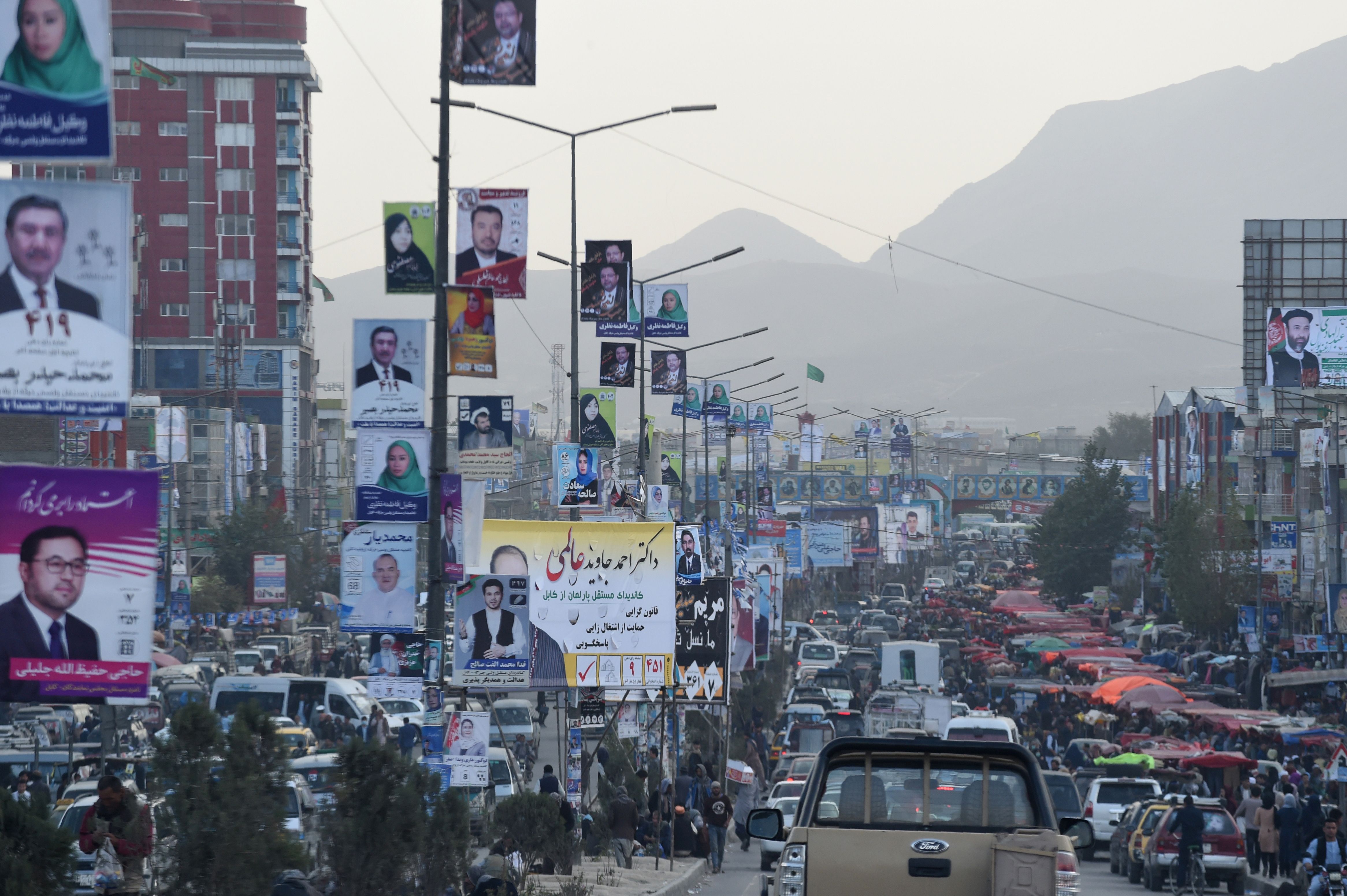
(Photo: Wakil Kohsar/AFP/Getty Images)
The chaos spilled into the new year. For a while, Nasib couldn’t make up his mind whether to continue holding meetings or to take a back seat and just wait for the results. He met with other candidates, who told him they were tendering buyout offers to various IEC officials, peddling propositions to everyone from data-center staffers all the way up to commissioners. In the first week of January, Nasib says, a close associate of Zamanzai, the IEC secretariat’s head, arrived at the candidate’s office. (Zamanzai denies any knowledge of this exchange.) Nasib welcomed him in, and the two began discussing the latest developments. The associate said he would help defend Nasib’s votes as the ballots were being counted. Nasib expressed his gratitude. Then, according to Nasib, the associate flashed an open palm.
Nasib suppressed a gasp and steadied his voice. “Fifty thousand?”
He says his visitor shook his head. “Five hundred thousand.”
“I was shocked,” Nasib later recalled. “I didn’t want to pay a penny, but I was disconcerted. What if it turned out to be true?” That night he discussed what to do with his father and team. “This was U.S. dollars, not Afghanis,” he told me. “The most we could muster was $100,000—even if we had made a deal.” He decided not to pursue it further.
When the preliminary results finally came out on January 14th, Nasib’s name was nowhere to be found.
The winning candidates shared one obvious feature: wealth. Nine of Kabul’s 33 parliamentary seats were constitutionally allotted to women; Nasib noted that almost all of the remaining 24 seats had been claimed by candidates with their own private fortunes. Ali Yawar Adili, who covered the elections for the Afghanistan Analysts Network, told me about multiple accusations of backdoor negotiations between candidates and IEC officials, often held outside the country in locations like Dubai. “People complain that money has been a factor ruling the IEC’s decisions,” Adili said. Old power in Afghanistan, born from blood and men, had conceded to the new power of cash and profits. An upstart class of millionaires would replace the ruthless warlords of past assemblies.
In Kabul, losing candidates reportedly rallied their supporters and took to the streets, blocking four main roads and calling for a repeat election. Nasib was more restrained. Shortly after learning the results, he logged online and tweeted: “We lost elections, but I’m grateful to everyone for their love & support & standing by me through thick & thin. Our campaign was truly inspirational. What doesn’t kill you makes you stronger. We will rise again!!!”
His team lodged its complaints through the proper channels while he tried to manage the uproar from his constituents, some of whom wanted to erect camps outside the IEC in protest. Nasib talked them down, but his public prudence masked deeper grievances. “Privately we’re discussing that we got robbed,” he told me.
Mostly, though, he felt the blow to a forsaken public. People he spoke to flipped between resentment and despondence. They decried the results “not of an election,” Nasib said, “but a selection.”

On a Thursday afternoon in February, I met Nasib at a Starbucks in Arlington, Virginia, a short drive from his former office job. He had briefly returned to D.C. to spend time with his wife and young son. He was wearing faded khakis and a loose hoodie zipped over a purple polo shirt; it was the first time I had seen him not dressed in a shalwar kameez. The campaign had worn him down, he said. With no time to exercise, he had gained 25 pounds. He was nervous about an upcoming doctor’s appointment.
In Afghanistan, results from the election have yet to be announced for five provinces, including Kabul. In February, President Ghani approved new amendments to the election law and dismissed all 12 commissioners from the IEC and its sister complaints agency. The Afghanistan Attorney General’s Office quickly issued a travel ban on the removed officials, before launching its own “high-level” investigation into allegations of their misconduct. In a confounding move, Ghani appointed Zamanzai to oversee the IEC as its interim chief, even as election observers pointed out that Zamanzai, in his position as the IEC secretariat boss, had weathered among the most serious corruption allegations of anyone involved. (Zamanzai is no longer employed by the IEC and recently incurred a travel ban of his own for his alleged involvement with election fraud.) With each bungled fix, a tolerable resolution seems to drift farther, not closer.
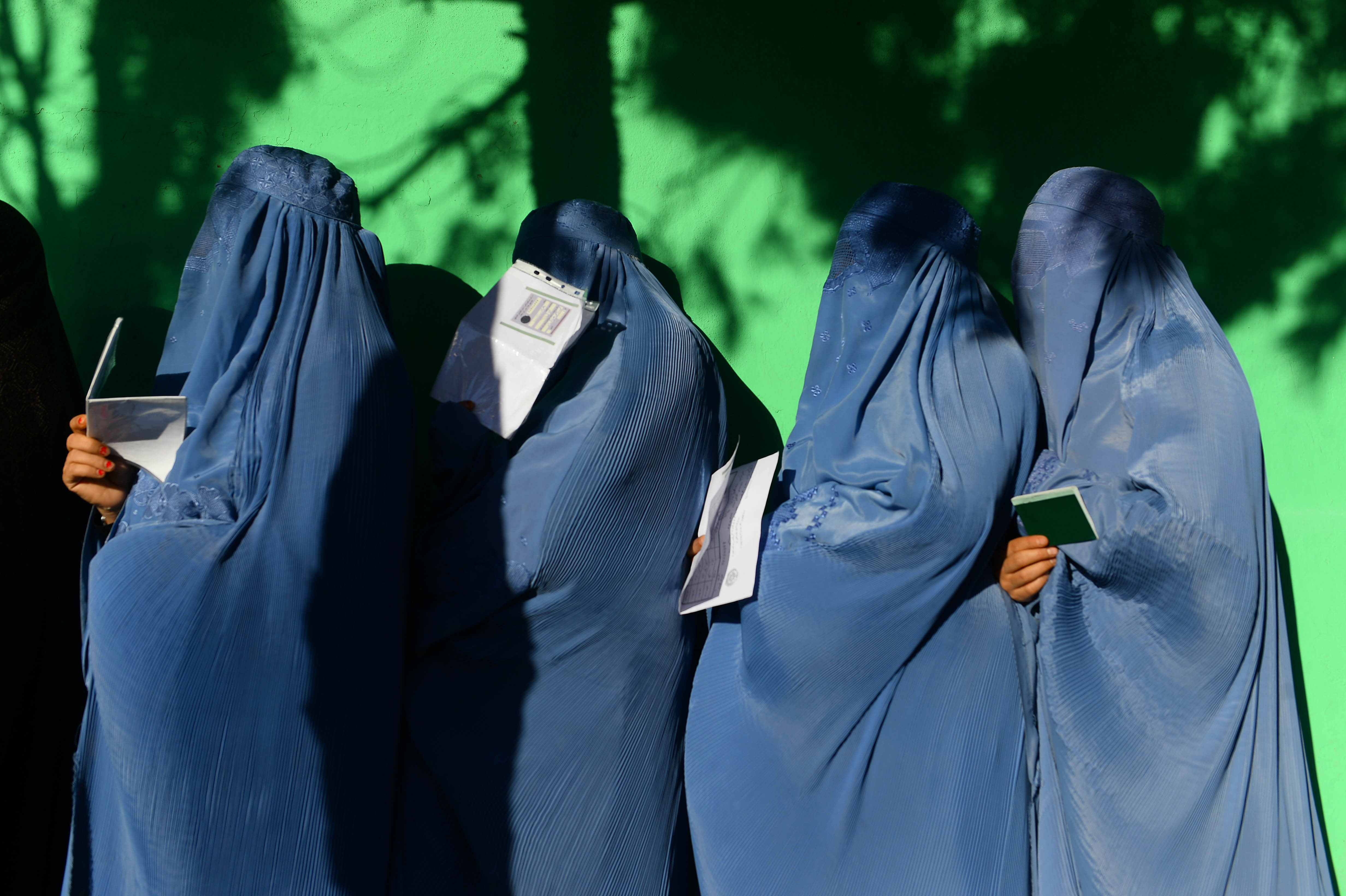
(Photo: Hoshang Hashimi/AFP/Getty Images)
Nasib had not entirely swallowed hope that an investigation would properly tally his votes and produce a different result. But he wasn’t counting on it. In Kabul, he had taken several meetings with other candidates, both winners and losers from the preliminary list. “Everyone is in limbo,” he told me. “Whatever amount of money they’ve used in the preliminary, they have some on the side for the final list as well. Everybody’s still worried.” He was ready to move on. He was looking ahead to the presidential election, scheduled at the time for July (and now postponed until September), in which he was angling to secure a principal role in Ghani’s campaign. Every morning he woke to dozens of WhatsApp messages, voice recordings from volunteers and supporters who had been stirred by his campaign and were counting on his success. “There’s a constituency,” Nasib said, “and they have expectations now. They want me to be in Kabul, so I can still offer them help anywhere they need.”
“Every day in Kabul is crisis management, but there’s going to be opportunities,” Nasib added. “Crisis brings opportunities. So we’ll see.”
It is true that opportunity can come from crisis, but crises themselves are often provoked by failed opportunities. Following three years of delay, Afghanistan’s parliamentary elections had initially been viewed as a “trial run,” a longtime American adviser in Afghanistan told me, intended to “strengthen the muscle” of the country’s electoral institutions ahead of the presidential election. Commonly cited among international observers, the analogy has since extended to reflect the bleak outcome: The muscle had been too weak. In attempting to lift too heavy an object, it had strained itself in the effort—perhaps beyond the rupture point.
Given the depth of disorder and the severity of damage to the public trust, nobody I spoke with believed that Afghanistan’s electoral muscle would be healed in time for the next round. Just a few months away, the presidential election carries amplified stakes and a powerful field of political firebrands and former militia commanders, bristling with influence, who will stop at nothing to inhabit the presidential palace.
Compounding the uncertainty is the specter of an American withdrawal and diminishing prospects of a desperately needed peace deal. Leading Afghan politicians, in defiance of President Ghani, have bypassed the government to negotiate with the Taliban directly. In the 17 years of its beleaguered standing, Afghanistan’s democratic state has rarely appeared more embroiled, its key contenders never more keen and calculating.
The cynicism has trickled down, taking root in the broader public. On a drive through Kabul’s congested, excitable streets last October, I was accompanied by a lifelong resident named Ramin, who surveyed all the activity around him with skepticism. Outside our window was the Afghan capital, counting down to election day, buildings and storefronts smocked in campaign bills.
Our car stalled at an intersection. Minutes passed. Nobody moved. In the vehicle ahead, a large sticker blocked the rear windshield, exhorting in white block letters: “BE HONEST.”
Ramin scoffed. “Instead of this sentence, it should say, ‘Be human.'”
Cars honked, bicycles slipped by. A gust of wind filled the intersection with dust. In Kabul, Ramin added, “you cannot find anyone who is honest.”

Author: Dan Xin Huang
Dan Xin Huang is a Beijing-based writer and a former reporter for the Wall Street Journal.
Photographer: Christopher Jones
Christopher Jones is a freelance photojournalist and contributing writer at Pacific Standard, who splits his time between New York City and Afghanistan. His work has been featured in such outlets as USA Today, the Washington Post, and Task & Purpose.
Editor: Ben Rowen
Photo Editor: Ian Hurley
Researcher: Jack Denton
Copy Editor: Leah Angstman





